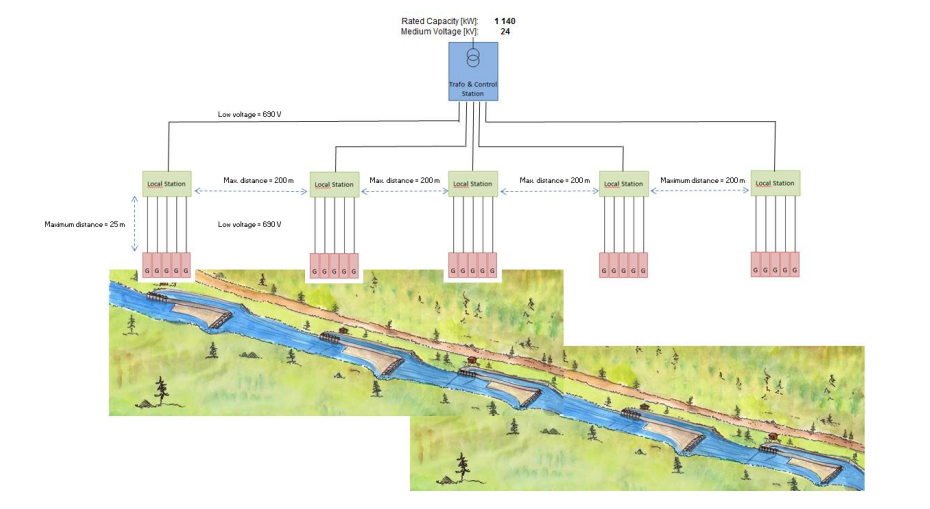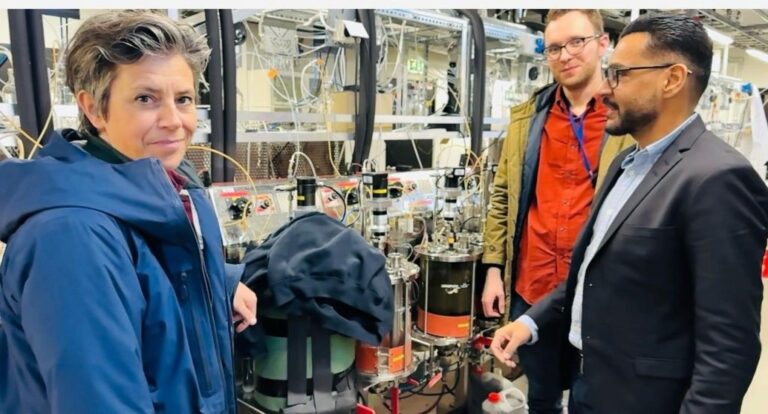Innovation and Research
Norhydro is committed to advancing the field of renewable energy through research and innovation. We actively collaborate with leading research institutes across Europe and maintain partnerships with top universities in Norway, ensuring that our energy solutions remain at the cutting edge of technology.
Through these collaborations, Norhydro participates in a range of innovative projects focused on developing sustainable, scalable energy technologies that address global and regional energy challenges. Our commitment to research enables us to tailor solutions that create long-term value for communities and businesses alike and our focus on innovation ensures that Norhydro is not only meeting today’s energy needs but also leading the way in creating the sustainable energy systems of the future.
rough these collaborations, Norhydro participates in a range of
Low-Head Hydro Power Generation
Funded by the European Commission, Norhydro in collaboration with its affiliated company Mini Hydro AS has engineered the Standardized and Modularized Low-Head Hydropower Concept. Unlike conventional approaches for hydropower generation, which require significant investment in equipment, this pre-engineered solution allows for multiple generator modules to be installed based on the water flow, making it highly adaptable.

This technology not only reduces costs but also opens small-scale hydropower opportunities across both developed and developing regions. By bringing this pioneering approach to Pakistan, Norhydro will contribute to the country’s renewable energy future, with plans to start projects in regions like Gilgit-Baltistan, Azad Kashmir, and beyond.
Key features of this solution include:
Standardized Modules: Each module is designed to suit specific head and flow conditions, allowing for flexibility and scalability.
Cost Efficiency: By standardizing components, the construction and installation costs are significantly reduced, making small low-head hydropower plants economically viable.
Cascading Installations: A series of thresholds and power plants can be installed in cascades along extended stretches of a river, increasing the overall energy output.
Constant Head Maintenance: A parallel water channel is constructed downstream of the threshold, maintaining a constant head at the generator module inlet.
Grid Interconnection: Multiple power plants can be electrically interconnected before being connected to the grid, ensuring efficient power transmission

Low Temperature Biomass Processing
In a project funded by Innovation Norway, Norhydro in collaboration with Norwegian Institute of Bio Economy Research (NIBIO), Plany AS, Norsok, and Bio Synergy, is pioneering a Low Temperature Biomass Processing project aimed at transforming how biogas is produced at the farm level. The project seeks to develop cost-effective and efficient methods for generating biogas from animal manure and organic agricultural waste. This initiative not only reduces greenhouse gas emissions but also provides farmers with localized, renewable energy solutions.
Addressing Global and Local Challenges
One of the challenges this project tackles is the high investment and operational costs of current biogas plants, which limits their adoption by small to medium-sized farms. Traditional biogas plants are essentially scaled-down versions of large, centralized systems that are not optimized for farm-level use. By rethinking the system design, Norhydro and its partners are working on a plant that operates at lower temperatures and with reduced energy consumption, making it a more feasible option for farmers.
This innovation solves several problems:
Environmental Impact: It minimizes the transportation of manure to central plants, thus reducing greenhouse gas emissions and transportation costs.
Farm-Level Control: Farmers can manage their biogas production locally, ensuring the quality of raw materials and increasing hygiene standards with bio-fertilizer produced on-site.
Economic Benefit: The values produced on the farm remain with the individual farmer, promoting self-sufficiency and economic sustainability.
Energy Efficiency: By using the gas for electricity production, it reduces the need for electricity transmission capacity, particularly in rural areas.
Bringing the Solution to Pakistan
The project’s potential extends far beyond Norway. Regions like Pakistan, where agricultural activities are widespread and there’s an increasing demand for renewable energy, present a perfect opportunity for implementing this technology. Pakistan’s agricultural sector produces a significant amount of organic waste, which could be converted into biogas using Norhydro’s low-temperature system. This would benefit both smallholder farmers and large-scale agricultural operations, especially in provinces like Punjab, Azad Kashmir, and Gilgit-Baltistan.
In Pakistan, biogas production at the farm level can have transformative impacts:
Energy Independence: Farmers can produce their own electricity, reducing dependence on national grids and costly energy imports.
Sustainability: The project promotes sustainable farming practices, improving both environmental and economic resilience in rural communities.
Local Resource Utilization: By using organic waste that would otherwise contribute to pollution, farmers contribute to a cleaner environment while generating renewable energy.

